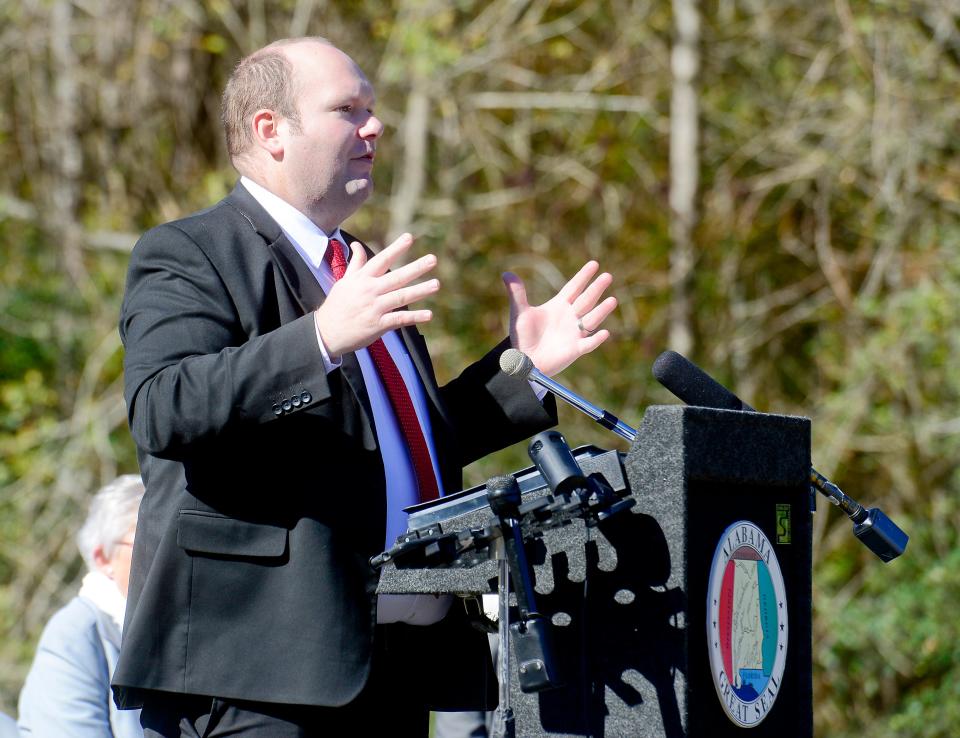Senate committee OKs Jones' occupational tax bill, with two changes
Sen. Andrew Jones’ attempt to limit or end occupational license fees, or taxes, in Alabama has cleared its first legislative hurdle.
SB65 was approved on Tuesday, with a couple of revisions, by the Senate’s County and Municipal Government Committee, on a 5-4 party-line vote, according to Jones, R-Centre.
The bill is labeled the “Family Income Protection Act,” and would cap occupational taxes at 1%. It would require any Alabama municipality with a higher rate to reduce it by two-tenths of a percent each year until it hits 1%.

Twenty-five municipalities currently levy occupational taxes, and seven of them charge a higher rate than 1%. The Etowah County quintet — Gadsden, Attalla, Glencoe, Rainbow City and Southside — and Tuskegee are at 2%. Opelika is at 1.5%.
The bill also contains a stipulation that would only impact Etowah County. It would require any county with two or more municipalities that are collecting more than a 1% occupational tax as of Jan. 1, 2023, to hold a referendum in 2028 on whether the tax should continue at all once the rate is reduced to 1%.
It would bar municipalities from adding or increasing occupational taxes moving forward; bar them from taxing temporary workers employed for 90 days or less; bar them from taxing disaster relief workers; bar them from taxing severance or retirement incentive pay; bar them from collecting occupational taxes on work done outside their corporate limits; and require them to set up a system for refunding improperly collected taxes.
One change in committee concerns future annexations by municipalities. Jones’ bill as introduced would bar municipalities from taxing workers in property annexed after Jan. 1, 2023. The revision changes that to industrial megasites of 1,000 or more acres.
That again would directly impact Etowah County, the County Commission having reached a Memorandum of Understanding last year with Rainbow City that it eventually would annex the county’s Northeast Alabama Regional Megasite to provide infrastructure and basic services.
The other change, an amendment to the bill, specifies that no drawdown of occupational taxes would occur until the January after any indebtedness by a municipality that is encumbered by such taxes is paid off.
“We still expect a few tweaks and refinements to the bill before it makes it to the floor,” Jones said.
Jones has said he's philosophically opposed to the idea of occupational taxes and believes they are unfair to working people. He introduced legislation last year to gradually phase them out altogether, which was unsuccessful.
Mayors of the five Etowah County municipalities, which garner significant funds from the tax (it provides roughly a third of Gadsden’s general fund revenue), have been vehement in their opposition to his efforts. They say drawing down the tax will mean drastic cuts in services unless the losses are offset by increases elsewhere, such as in property taxes, and they have criticized Jones for what they see as meddling in their business.
Jones has said they’re playing on people’s fears. He believes that the county’s taxpayers are his business and he wants to put more money in their pockets, and that he’s heard opposition to the taxes since his initial campaign for the Senate in 2018, especially from people in unincorporated areas who work in cities that levy them but have no input in how those cities are run.
This article originally appeared on The Gadsden Times: Senate committee OKs Jones' occupational tax bill

